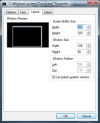Hello,
The following code works but I am having trouble formatting it with setw() and I am not sure if it possible to format it with a space so that the entire seat header fits on one line and for the rows to also fit on one line with spaces.
My code is the following:
void Tickets::displaySeats()
{
cout << "Seats: ";
int counter = 1;
do
{
cout << counter << " ";
}while(++counter <= 30);
for(int row_i = 1; row_i < row; row_i++)
{
cout << "\nrow " << row_i << ": ";
for (int seat_j = 1; seat_j < seat; seat_j++)
cout << seating[row_i][seat_j] << " ";
}
}
